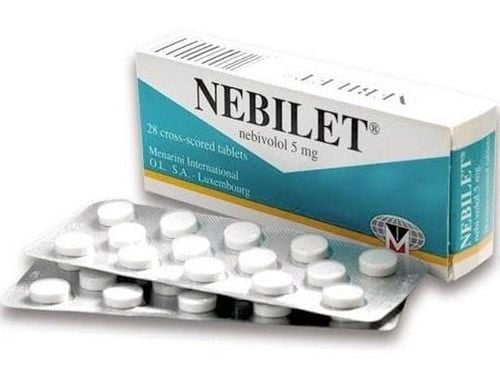This is an automatically translated article.
Coversyl Plus is a combination of the arginine salt of perindopril (an ACE inhibitor) with indapamide (a chlorosulphamoyl diuretic). The drug is commonly prescribed to treat high blood pressure. What are the uses of Coversyl? Check out the article below.1. Uses of Conversyl Plus
Coversyl Plus is a product from Les Laboratoires Servier (France/France). Coversyl Plus is made in the form of film-coated tablets, white, rods (pillars), each containing 5mg perindopril arginine (equivalent to 3.395mg perindopril) and 1.25mg indapamide.
Conversyl Plus has the main ingredients perindopril arginine and indapamide is indicated for the treatment of hypertension and is used in cases of high blood pressure (hypertension). On the other hand, Coversyl is not allowed to be prescribed in the following cases:
Known allergy to perindopril, indapamide or sulphonamide or to any of its ingredients Patients with a history of Quicke's edema (an itchy rash with sudden facial and neck edema) associated with the use of ACE inhibitors. History of Quincke's edema of hereditary or unknown etiology. Patients with untreated decompensated heart failure. Patients with severe liver and kidney failure. People with low blood potassium levels. Pregnant women are also breastfeeding. Children.
2. Usage and dosage of Conversyl Plus
2.1. How to take Coversyl Plus is taken orally. Doctors recommend that patients should take the medicine in the morning and take it on an empty stomach. The patient should take the tablet whole with a large glass of water. Absolutely do not crush or break in half unless directed by your doctor.
2.2. Dosage The doctor can adjust and change the dose to suit the patient's condition and treatment purpose. Usually, the recommended dose is one tablet once a day. To use the drug safely, the patient needs to take the medicine according to the doctor's instructions.
In fact, there have been cases of overdose when using Coversyl 5mg. Some signs of an overdose such as nausea, vomiting, muscle cramps, dizziness, drowsiness, confusion, less urination can lead to anuria (due to a decrease in blood volume). Salt and water disturbances (low sodium and potassium levels). When falling into an overdose, the patient should be taken to the nearest medical facility for a doctor's examination and measures to quickly eliminate the drug components from the body. The doctor may prescribe measures such as:
Gastric lavage Drink activated charcoal Disturbance in fluid and electrolyte balance Even intravenous infusion with isotonic NaCl solution or other methods to compensate for volume.
3. Coversyl drug side effects
During the use of Coversyl 5mg, patients may experience some unwanted side effects such as:
Most common effects: Headache, dizziness, dizziness, dizziness due to low blood pressure, cough, gasping for breath, nausea, vomiting, dry mouth, dyspepsia, diarrhea, constipation), allergic reactions. Less common side effects: Mood swings, sleep disturbances, bronchospasm, angioedema, kidney disorders, impotence, sweating. Some very rare side effects: Confusion, irregular heartbeat, angina, heart attack, rhinitis... If you experience these side effects, you need to stop using the medicine immediately. and notify your doctor.
4. Coversyl Plus drug interactions
When using one or more drugs in combination with Conversyl Plus, it may cause interactions. This interaction process may involve Conversyl Plus, perindopril, indapamide. Specifically:
4.1. Concerning Conversyl Plus Co-administration of Conversyl Plus with Lithium: Increased lithium levels may produce signs of Overdose, similar to those associated with a sodium-free diet (reduced renal excretion of lithium). If the combination of an ACE inhibitor with a potassium-sparing diuretic cannot be avoided, lithium levels should be closely monitored and dosage adjusted as necessary. Conversyl Plus should not be combined with antidiabetic drugs (insulin, anti-diabetic sulphonamides) Use of ACE inhibitors with Conversyl Plus may increase the hypoglycaemic effect in diabetics taking insulin or other medications. anti-diabetic sulphonamides. The onset of episodes of hypoglycaemia is very rare (improvement of glucose tolerance with a resultant reduction in insulin requirements). Conversyl Plus should not be combined with Baclofen because it may increase the hypotensive effect. NSAID (systemic route), high dose salicylates: Acute renal failure in dehydrated patients (decreased glomerular filtration rate). Imipramime-like antidepressants (tricyclic), neuroleptics should not be prescribed with Conversyl Plus because of the potential for increased hypotensive effect and increased risk of orthostatic hypotension (synergistically). add). Do not use Conversyl Plus with corticosteroids, tetracosactide 4.2. Related to perindopril Potassium-sparing diuretics (spironolactone, triamterene, used alone or in combination...), potassium salts taken with perindopril increase potassium levels (increase mortality), especially in the presence of renal failure ( increase the effect of potassium accumulation). Experts recommend not taking perindopril at the same time as anesthetics, which can increase the blood pressure lowering effect of some anesthetics. Allopurinol, cytostatic or immunosuppressive corticosteroids (systemic administration) or procainamide: Combination with ACE inhibitors may increase the risk of leukopenia. Antihypertensives: Enhances the antihypertensive effect of ACE inhibitors. 4.3. Related to indapamide Drugs that are not antiarrhythmic but prolong the QT interval or cause torsades de pointes such as astemizole, bepridil, intravenous erythromycin, halofantrine, pentamidine, sultopride, terfenadine, vincamine... NSAIDs (systemic administration) , high doses of salicylates Acute renal failure in dehydrated patients (decreased glomerular filtration rate). Patients should be rehydrated, renal function should be monitored at the beginning of treatment. Potassium-depleting drugs: Amphotericin B (intravenous administration), glucorticiod and mineral corticosteroids (systemic administration), tetra cosactide, stimulant laxatives: Increased risk of decreased potassium levels (additional association). Blood potassium levels should be monitored and adjusted as necessary; Special attention should be paid to the use of cardiac glycosides. Non-stimulant laxatives should be used. Cardiac Glycosides: Low potassium levels increase the toxicity of cardiac glycosides. The serum potassium level and the electrocardiogram should be monitored and, when necessary, treatment should be reviewed. Potassium-sparing diuretics (amiloride, spironolactone, triamtren): This reasonable combination may be of great benefit in some patients, not excluding the onset of hypokalemia or particularly in renal failure or diabetes. , which increases potassium levels. Potassium levels and electrocardiograms should be monitored and, when necessary, re-evaluated. Antiarrhythmic drugs that cause torsades de pointes, of class IA (guinidine, hydroguinidin, disopyramide), amiodarone, bretylium, sotalol: Causes torsades de pointes. Prevent low potassium levels and correct as needed: QT interval monitoring. In the presence of torsades de pointes, antitordibular drugs (pacemakers) should not be used.
5. Be careful when using Coversyl
To use the drug safely, patients need to "take it to heart" some of the following notes:
Patients with the following conditions should be careful when taking Coversyl: Aortic stenosis; People with heart or kidney or liver problems; Systemic lupus erythematosus or scleroderma, atherosclerosis, hyperparathyroidism. Pregnant women should not take this medicine during the first trimester, because it can cause serious harm to the fetus if taken during this period. Women who are breastfeeding should also not take this medicine to avoid affecting the infant through breast milk. Patients who plan to have surgery, have diarrhea, are dehydrated, have a medical test, and need to inject iodinated contrast media should inform their doctor before prescribing Conversyl Plus. In fact, Conversyl does not usually affect alertness when driving or operating machinery. However, in some patients, the drug can cause side effects such as dizziness, fatigue... so the operation of machines is more or less affected.
Please dial HOTLINE for more information or register for an appointment HERE. Download MyVinmec app to make appointments faster and to manage your bookings easily.













